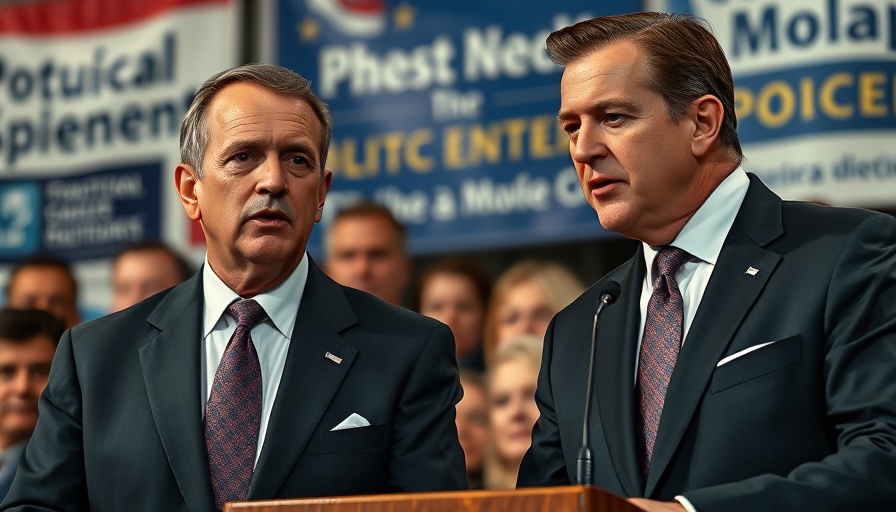
Barred From the Ballot: The Exclusion of Maurice Kamu
The recent decision by Cameroon's electoral commission, ELCAM, to bar opposition politician Maurice Kamu from running in the upcoming presidential elections has thrown the nation into a state of political uncertainty. Long viewed as a formidable contender against President Paul Biya, who has been in power for nearly four decades, Kamu’s disqualification raises pressing questions about the integrity of the electoral process in Cameroon.
In 'Cameroon's electoral body bars president's main rival from standing,' the discussion dives into electoral integrity in Cameroon, exploring key insights that sparked deeper analysis on our end.
A Long Shadow Over Elections
Cameroon's political landscape has been marked by the enduring rule of President Biya, who recently confirmed his bid for an eighth term. The electoral commission cites Kamu's acceptance of a nomination from the Cameroon Renaissance Movement (CRM) - which chose to boycott the last legislative and municipal elections as a basis for his disqualification. This raises a significant issue; under the electoral code, parties that boycott elections lose the right to nominate candidates. Consequently, the commission’s decision may seem legally sound, yet it highlights the selective enforcement of electoral regulations that often favor the incumbent government.
The Risk of Political Turbulence
With Kamu's exclusion from the race, the landscape has shifted dramatically. Currently, there are only twelve candidates left, and many political analysts believe that this could lead to increased tensions and protests from Kamu's supporters and broader political dissidents. The CRM’s commitment to reforming Cameroon's political process, alongside their historic boycott, places them at odds with the current regime, potentially igniting public unrest as citizens rally for fair representation.
The Embers of Change: Will Cameroonians Rise?
The ongoing struggles for political representation and democratic governance in Cameroon resonate deeply within the broader context of African politics. Movements throughout the continent have shown that systemic oppression often ignites public demand for accountability and reform. As such, the ramifications of Kamu's exclusion may not just alter the immediate political landscape but could serve as a catalyst for a larger movement for electoral integrity across Africa. Evolving youth demographics and a growing thirst for democratic freedoms signify that change may be on the horizon.
Parallel Trends Across Africa
Cameroon is not alone in grappling with electoral integrity. Across the continent, numerous countries have witnessed similar patterns of disqualification and systemic barrier creation against opposition leaders. In countries like Uganda and Zimbabwe, challengers often face legal hurdles that serve to maintain the status quo. Understanding these dynamics not only provides context for the situation in Cameroon but also underscores the need for a unified continental approach to safeguard electoral processes.
Looking Ahead: Insights and Predictions
As the 12th of October approaches, all eyes will be on the unfolding events in Cameroon. Observers predict that the absence of a prominent challenger like Kamu may lead to heightened political apathy or may paradoxically stir a desire among citizens for change amid governmental stagnation. The pattern of systemic oppression can lead to public dissent, raising the stakes for the ruling elite who must now navigate these turbulent waters carefully.
The Future of Cameroon’s Political Landscape
While the electoral commission's ruling may temporarily solidify President Biya's hold on power, it could also foster a burgeoning opposition movement grounded in the demand for fairness and representation. The ramifications of Kamu's exclusion, if met with significant public outcry, could embolden other politicians and civil society movements to challenge unjust electoral practices, thereby igniting a new chapter in Cameroon’s political narrative.
It’s crucial for voters, activists, and political analysts alike to remain vigilant and engaged as the situation evolves. Following this developing story will not only yield insight into the intricacies of Cameroonian politics but also the broader implications for African governance and democratic processes. Understanding these dynamics is essential to fostering preventing disenfranchisement, preserving electoral fairness, and advocating for the principles of democracy across the continent.
 Add Row
Add Row  Add
Add 




Write A Comment